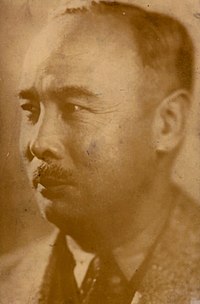You can help expand this article with text translated from the corresponding article in Korean. (March 2023) Click [show] for important translation instructions.
|
Lyuh Woon-hyung | |
|---|---|
여운형 | |
 Lyuh in May 1947 | |
| Deputy Minister of Foreign Affairs of the Korean Provisional Government | |
| In office 5 August 1919 – 22 January 1920 | |
| Chairman of the National People's Representative Conference | |
| In office 14 September – November 1945 | |
| Preceded by | Position established |
| Succeeded by | Position abolished |
| Personal details | |
| Born | 25 May 1886 Yangpyeong, Gyeonggi, Joseon |
| Died | 19 July 1947 (aged 61) Rotary road, Hyehwa-dong, Jongno District, Seoul, southern Korea |
| Manner of death | Assassination |
| Resting place | Ui-dong, Gangbuk District, Seoul, South Korea |
| Political party | People's Party of Korea (1945–1947) Laboring People's Party (1947) |
| Spouse | Jin Sang-ha |
| Children | 9 |
| Parent(s) | Lee (Mother) Lyuh Jung-hyun (Father) |
| Alma mater | Jinling University, Pyongyang Presbyterian Theological Seminary |
| Website | Mongyang Memorial Society |
| Korean name | |
| Hangul | 여운형 |
| Hanja | 呂運亨 |
| Revised Romanization | Yeo Unhyeong |
| McCune–Reischauer | Yŏ Unhyŏng |
| Art name | |
| Hangul | 몽양 |
| Hanja | 夢陽 |
| Revised Romanization | Mongyang |
| McCune–Reischauer | Mongyang |
Lyuh Woon-hyung (Korean: 여운형; RR: Yeo Unhyeong; 25 May 1886 – 19 July 1947), also known by his art name Mongyang (몽양; 夢陽), was a Korean independence activist and reunification activist.
Lyuh was a prominent figure in the Korean Provisional Government during the Japanese colonial period.[1] He is rare among politicians in modern Korean history for being revered in both South and North Korea.[citation needed]
- ^ Weems, Benjamin (1948). "Behind the Korean Election". Far Eastern Survey. 17 (12): 143. doi:10.2307/3022008. ISSN 0362-8949. JSTOR 3022008.